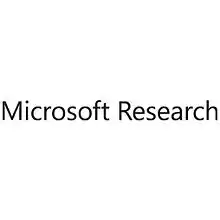Microsoft Research Asia
Microsoft Research Asia, Microsoft's fundamental research arm in the Asia Pacific region and the company's largest research institute outside the United States, was founded in Beijing China on November 5, 1998.[1] It employs around 200 researchers and engineers, has fostered more than 6,000 interns, has awarded over 400 Microsoft fellowships, has published over 5,000 papers for top international journals and conferences, and has achieved many technological breakthroughs.[2] It is one of the seven Microsoft Research labs.[3] The current managing director of Microsoft Research Asia is Hsiao-Wuen Hon.[4] In Sept. 2018, Microsoft announced the establishment of Microsoft Research Asia-Shanghai.[5]
 | |
 Tower 2, Microsoft Building in Zhongguancun, Beijing, China | |
| Headquarters | Tower 2, Microsoft Building, No. 5 Danling Street, Haidian District, Beijing , China |
|---|---|
Key people | |
| Website | www |
MSR Asia conducts both basic and applied research in areas central to Microsoft's long-term strategy and future computing vision: Natural User Interface, Intelligent multimedia, Artificial intelligence, Cloud and edge computing, Big data and knowledge mining and Computer science fundamentals.
Technologies from MSR Asia have had a large influence within Microsoft's products innovation. Almost every Microsoft core product contains technological innovation from MSR Asia, including Office, Windows, Azure, Bing, Visual Studio, Xbox, Kinect and HoloLens, etc.[6]
In addition, technologies from the lab have been adopted by international standards bodies such as MPEG4 (error-resilient video transmission), IETF (TCP/IP header compression), and ITU/ISO (video-compression technology).[7]
MSR Asia has excelled at creating a talent-fostering environment, where researchers are free to explore and pursue what interests them. This culture not only drives researchers to develop groundbreaking technologies and work at the cutting edge, but has also made the lab a natural partner for academia.[8]
June 2004, Microsoft Research Asia appeared on the cover of MIT Technology Review and was hailed as "the world's hottest computer lab."[9]
Academic Collaboration
MSR Asia cooperates with many universities and research institutions in the Asia-Pacific region to foster innovative research and advanced education, and to promote academic collaboration.[10]
The outreach team of MSR Asia organized various programs and events, including Joint Lab program,[11] Fellowship program,[12] Visiting Young Faculty program, The Stars of Tomorrow internship program, Joint-PhD program, Microsoft Student Club, Ada Workshop,[13] etc. One component of these new initiatives is an emphasis on regional programs that extend collaborations with universities in Hong Kong, Taiwan, Japan, South Korea, and Singapore.[14]
In order to cooperate more smoothly and extensively with universities, MSR Asia launched Research Collaboration Program to support in-depth collaboration between academics from universities and research institutions in Asia and MSR Asia's researchers on research topics of mutual interest. Until now, MSR Asia has funded over 1,370 joint research projects, benefiting more than 1,000 professors from 118 universities in Asia-Pacific.[15]
Events
In addition to fundamental research MSR Asia also plays host to events that facilitate collaboration among academics, researchers, and industry experts. These events include:
Notable Developments
Researchers at MSR Asia have contributed to a number of technological breakthroughs:
- ResNet (Residual Network) for deep neural networks[18]
- Mahjong AI Suphx[19]
- Machine reading comprehension technologies[20]
- Machine translation technologies[21]
- Speech to Speech translation[22]
- Urban Air[23]
- SORA[24]
- OpenPAI[25]
- HRNet[26]
- LightGBM[27]
- UniLM[28]
- Faster speech recognition technology[29]
- Engkoo, a multi-functional English aid tool[30]
See also
References
- "Microsoft builds R&D Dream Team in Beijing".
- "Microsoft Research Asia".
- "About Research at Microsoft". Microsoft Research. Retrieved February 22, 2019.
- "In China, Microsoft eyes innovation". CNET.
- "Microsoft grows regional AI capability through two Shanghai innovation hubs". Channel Asia.
- "Growing a generation of computer scientists – Microsoft Research Asia at 20 and going beyond technical achievement". Microsoft Research.
- "Microsoft Research Asia Overview".
- "Growing a generation of computer scientists – Microsoft Research Asia at 20 and going beyond technical achievement". Microsoft Research.
- "The World's Hottest Computer Lab". MIT Technology Review.
- "Growing a generation of computer scientists – Microsoft Research Asia at 20 and going beyond technical achievement". Microsoft Research.
- "HKUST to upgrade joint research lab in collaboration with Microsoft Research". South China Morning Post.
- "Fellowships at Microsoft Research Asia". Microsoft Research.
- "ADA WORKSHOP ENTERS USTC". USTC.
- "Microsoft Research Connections".
- "MSRA Collaborative Research 2019 Grant Awards Announcement". Microsoft Research.
- "Computing in the 21st Century 2019 - Microsoft Research".
- "Computing in the 21st Century Conference & Asia Faculty Summit on MSRA's 20th Anniversary - Microsoft Research".
- "Introduction to ResNets".
- "Microsoft's Mahjong-winning AI could lead to sophisticated finance market prediction systems". VentureBeat.
- "AI beats humans in Stanford reading comprehension test". CNET.
- "Microsoft announces breakthrough in Chinese-to-English machine translation". TechCrunch.
- "Scientists See Promise in Deep-Learning Programs". The New York Times.
- "As pollution in Beijing reaches extreme levels, here's what Microsoft Research is doing to help". GeekWire.
- "GitHub - microsoft/Sora: The Microsoft Research Software Radio (Sora) is a programmable software radio platform based on the commodity multicore CPU in a host PC. The SDK provides the drivers, user mode 802.11a/b/n samples, and a debug plot tool". GitHub.
- "GitHub - microsoft/pai: Resource scheduling and cluster management for AI". GitHub.
- "HRNet · GitHub". GitHub.
- "GitHub - microsoft/LightGBM". GitHub.
- Dong, Li; Yang, Nan; Wang, Wenhui; Wei, Furu; Liu, Xiaodong; Wang, Yu; Gao, Jianfeng; Zhou, Ming; Hon, Hsiao-Wuen (2019). "Unified Language Model Pre-training for Natural Language Understanding and Generation". arXiv:1905.03197 [cs.CL].
- "Microsoft revs speedier, smarter speech recognition for phones".
- "Microsoft Mines Web to Hone Language Tool".